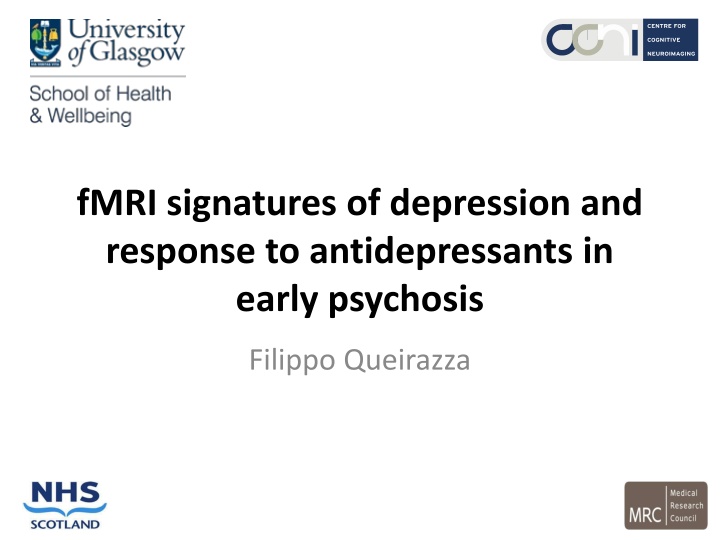
fMRI Signatures of Depression and Response to Antidepressants in Early Psychosis
Explore the intricate relationship between depressive and negative symptoms in early psychosis, utilizing fMRI to study response to antidepressants. Discover the overlapping symptom domains and implications for treatment efficacy, with a focus on identifying individual-level predictors and biomarkers for SSRI response. Take part in trainee tasks involving recruitment, informed consent, and questionnaire completion. Visit the Cognitive Centre for Neuroimaging at UoG for this research endeavor.
Download Presentation

Please find below an Image/Link to download the presentation.
The content on the website is provided AS IS for your information and personal use only. It may not be sold, licensed, or shared on other websites without obtaining consent from the author. If you encounter any issues during the download, it is possible that the publisher has removed the file from their server.
You are allowed to download the files provided on this website for personal or commercial use, subject to the condition that they are used lawfully. All files are the property of their respective owners.
The content on the website is provided AS IS for your information and personal use only. It may not be sold, licensed, or shared on other websites without obtaining consent from the author.
E N D
Presentation Transcript
fMRI signatures of depression and response to antidepressants in early psychosis Filippo Queirazza
Background Around half of patients presenting with EP will develop depressive symptoms. Similarly, negative symptoms are highly prevalent (i.e. 51%) in EP and often run a chronic course. Negative and depressive symptom domains significantly overlap. While antidepressants are efficacious in treating depressive symptoms their efficacy in the treatment of negative symptoms is poor.
Rationale Depressive and negative symptoms have been linked with impaired behaviour and abnormal fMRI activity during during RL (i.e. learning from reward and punishment) Impaired aversive learning (i.e. learning to avoid punishment-predicting stimuli) in patients with depressive symptoms but not in patient with negative symptoms.
? Study Procedure Visit 1 Visit 2 Visit 3 Patient Information Sheet Inclusion/Exclusion criteria MRI safety checklist Written Informed Consent fMRI Scale for the Assessment of Negative Symptoms (SANS) Hamilton Depression Rating Scale (HDRS) National Adult Reading Test (NART) Calgary Depression Scale for Schizophrenia (CDSS)
Primary aims Prediction of response to SSRI treatment at the individual level. Identification of model-based fMRI biomarkers differentiating between negative and depressive symptoms in EP. Secondary aims Identification of computational biomarkers differentiating between negative and depressive symptoms in EP.
Trainee Tasks 1. Identification and recruitment of potential participants 2. Gaining informed consent 3. Completion of study s questionnaires at visit 1 and 3 4. Explain task to participant and help out with fMRI during visit 2
Research site: Cognitive Centre for Neuroimaging in the Department of Psychology at the UoG Base: Mental Health & Wellbeing, Gartnavel Royal hospital.
